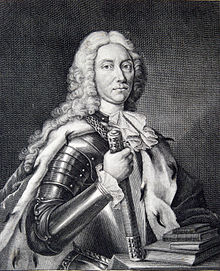
Back ديمتري كانتيمير Arabic ديميترى كانتيمير (ملحن) ARZ Demetrio Cantemir AST Dmitri Kantemir Azerbaijani Дзмітрый Канстанцінавіч Кантэмір Byelorussian Димитрие Кантемир Bulgarian Dimitrie Cantemir BS Dimitrie Cantemir Catalan Dimitrie Cantemir Czech Dimitrie Cantemir German
| Dimitrie Cantemir | |
|---|---|
 Portrait from the first edition of the Descriptio Moldaviae, 1716 | |
| Prince of Moldavia | |
| Reign | March 1693–April 1693 (first reign) January 1710–August 1711 (second reign) |
| Predecessor | Constantin Cantemir (first reign) Nicholas Mavrocordatos (second reign) |
| Successor | Constantin Duca (first reign) Lupu Costachi (second reign) |
| Born | 26 October 1673 Silișteni (now Dimitrie Cantemir), Vaslui County, Principality of Moldavia |
| Died | 21 August 1723 (aged 49) Dmitrovsk, Oryol Oblast, Russian Empire |
| Burial | |
| Spouse | Casandra Cantacuzino Anastasiya Trubetskaya |
| Issue | Matei Șerban Maria Cantemir Constantin Antiochus Kantemir Ekaterina Golitsyna |
| House | Cantemirești |
| Father | Constantin Cantemir |
| Mother | Ana Bantaș |
Dimitrie or Demetrius[1] Cantemir (Romanian pronunciation: [diˈmitri.e kanteˈmir] ⓘ, Russian: Дмитрий Кантемир; 26 October 1673 – 21 August 1723), also known by other spellings, was a Moldavian prince, statesman, and man of letters.[2][3] He twice served as voivode of Moldavia (March–April 1693 and 1710–1711). During his second term he allied his state with Russia in a war against Moldavia's Ottoman overlords; Russia's defeat forced Cantemir's family into exile and the replacement of the native voivodes by Greek phanariots. Cantemir was also a prolific writer, variously a philosopher, historian, composer, musicologist, linguist, ethnographer, and geographer. His son Antioch, Russia's ambassador to Great Britain and France and a friend of Montesquieu and Voltaire, would become known as "the father of Russian poetry".
- ^ Baynes, T. S., ed. (1878), , Encyclopædia Britannica, vol. 5 (9th ed.), New York: Charles Scribner's Sons, p. 28; Gaster, Moses (1911), , in Chisholm, Hugh (ed.), Encyclopædia Britannica, vol. 5 (11th ed.), Cambridge University Press, p. 209
- ^ The Great Cauldron: A History of Southeastern Europe – Marie–Janine Calic. Harvard University Press. 2019. pp. 146–149. ISBN 9780674983922. Retrieved 30 September 2021.
- ^ Ciulei, Tomiţă (2014). "Profile of an East-European Thinker. Dimitrie Cantemir's Humanism". Procedia - Social and Behavioral Sciences. 149: 189–194. doi:10.1016/j.sbspro.2014.08.186.